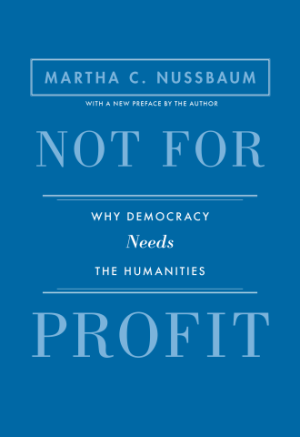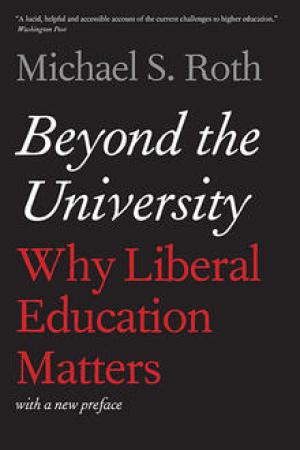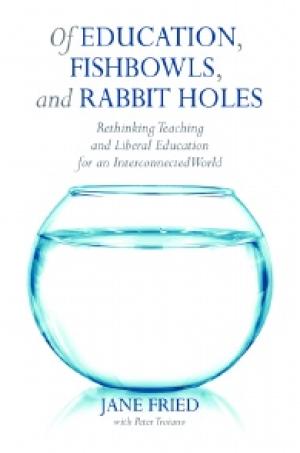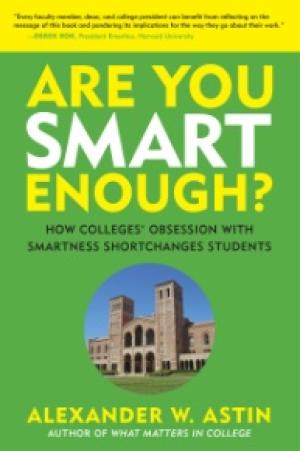Resources
This edited transcript of a roundtable “fishbowl” conversation at a session of the 2018 national conference of the American Academy of Religion brings three teaching scholars together around a shared reading of Jane Fried's book, Education, Fishbowls, and Rabbit Holes: Rethinking Teaching and Liberal Education for an Interconnected World (Stylus, 2016). Fried's concept of student “self‐authorship” quickly emerges as the dominant theme of the conversation, providing fresh perspectives on the purposes and goals of an academic classroom and the place of the study of religion within the liberal arts curriculum.

In this short and powerful book, celebrated philosopher Martha Nussbaum makes a passionate case for the importance of the liberal arts at all levels of education. Historically, the humanities have been central to education because they have been seen as essential for creating competent democratic citizens. But recently, Nussbaum argues, thinking about the aims of education has gone disturbingly awry in the United States and abroad. We increasingly treat education as though its primary goal were to teach students to be economically productive rather than to think critically and become knowledgeable, productive, and empathetic individuals. This shortsighted focus on profitable skills has eroded our ability to criticize authority, reduced our sympathy with the marginalized and different, and damaged our competence to deal with complex global problems. And the loss of these basic capacities jeopardizes the health of democracies and the hope of a decent world. In response to this dire situation, Nussbaum argues that we must resist efforts to reduce education to a tool of the gross national product. Rather, we must work to reconnect education to the humanities in order to give students the capacity to be true democratic citizens of their countries and the world. In a new preface, Nussbaum explores the current state of humanistic education globally and shows why the crisis of the humanities has far from abated. Translated into over twenty languages, Not for Profit draws on the stories of troubling—and hopeful—global educational developments. Nussbaum offers a manifesto that should be a rallying cry for anyone who cares about the deepest purposes of education. (From the Publisher)

Contentious debates over the benefits—or drawbacks—of a liberal education are as old as America itself. From Benjamin Franklin to the Internet pundits, critics of higher education have attacked its irrelevance and elitism—often calling for more vocational instruction. Thomas Jefferson, by contrast, believed that nurturing a student’s capacity for lifelong learning was useful for science and commerce while also being essential for democracy. In this provocative contribution to the disputes, university president Michael S. Roth focuses on important moments and seminal thinkers in America’s long-running argument over vocational vs. liberal education. Conflicting streams of thought flow through American intellectual history: W. E. B. DuBois’s humanistic principles of pedagogy for newly emancipated slaves developed in opposition to Booker T. Washington’s educational utilitarianism, for example. Jane Addams’s emphasis on the cultivation of empathy and John Dewey’s calls for education as civic engagement were rejected as impractical by those who aimed to train students for particular economic tasks. Roth explores these arguments (and more), considers the state of higher education today, and concludes with a stirring plea for the kind of education that has, since the founding of the nation, cultivated individual freedom, promulgated civic virtue, and instilled hope for the future. (From the Publisher)
The learning goals of a well‐designed course in the liberal arts include not only the imparting of knowledge but also the development of critical thinking and disciplinary expertise. A class on Luther can help students acquire those intellectual skills associated with the discipline of history and the liberal arts more generally as they consider broader questions about institutional religion, spirituality, moral choices, and human agency. Current scholarship on how people learn highlights the importance of adequate mental frameworks for the acquisition, retention, and retrieval of new ideas and information. This scholarship underlies the choice of specific strategies used to teach about Luther and the Reformation. Assignments provide “scaffolding,” which begins with modeling and then moves from simpler to more complex assignments. Students practice the specific intellectual skills of critical reading and textual analysis over the course of the semester.
Discussions of world citizenship that elide the challenge of grappling with religious worldviews expose a covert intolerance at the very core of secularism, calling into question the “liberality” of liberal education. The ethical imperative of engaging with different worldviews not only demands that religions be taught, but also raises questions regarding how religious worldviews should be taught.
This paper presents a critique of a set of teaching strategies known as “contemplative pedagogy.” Using practices such as meditation, attentive listening, and reflective reading, contemplative inquiry focuses on direct first-person experience as an essential means of knowing that has historically been overshadowed and dismissed by an emphasis on analytical reasoning. In this essay, I examine four problematic claims that appear frequently in descriptions of contemplative pedagogy: (1) undergraduate students have a kind of spiritual hunger; (2) pedagogies focused on cognitive skills teach students only what, not how, to think; (3) self-knowledge fosters empathy; and (4) education needs a new epistemology centered on spiritual and emotional, rather than intellectual, experience. I argue that these claims underestimate the diversity of undergraduate students, the complexity of what it means to think and know, the capacity for self-knowledge to become self-absorption, and the dangers of transgressing the boundaries between intellectual, psychological, and religious experiences. [See as well “Response to Kathleen Fisher's ‘Look Before You Leap,’” by Andrew O. Fort and Louis Komjathy, published in this issue of the journal.]

This book questions some of our most ingrained assumptions, not only about the nature of teaching and learning, but about what constitutes education, and about the cultural determinants of what is taught. What if who you think you are profoundly affects what and how you learn? Since Descartes, teachers in the Western tradition have dismissed the role of self in learning. What if our beliefs about self and learning are wrong, and relevance of knowledge to self actually enhances learning, as current research suggests? Jane Fried deconstructs the Grand Western Narrative of teaching and learning, describing it is a cultural fishbowl through which we see the world, rarely aware of the fishbowl itself, be it disciplinary constructs or the definition of liberal education. She leads us on a journey to question “the way things are”; to attend to the personal narratives of others from ethnic, racial and faith groups different from ourselves; to rediscover self-authorship as the core task of learning in college; and to empower ourselves and students to navigate the disorientation of the Alice in Wonderland rabbit holes of modern life. This is a book for all educators concerned about the purpose of college and of the liberal arts in the 21st century, and what it is we should reasonably expect students to learn. Jane Fried both upends many received ideas and offers constructive insights based on science and evidence, and does so in an engaging way that will stimulate reflection. (From the Publisher)

Click Here for Book Review This book explores the many ways in which the obsession with “being smart” distorts the life of a typical college or university, and how this obsession leads to a higher education that shortchanges the majority of students, and by extension, our society’s need for an educated population. The author calls on his colleagues in higher education to return the focus to the true mission of developing the potential of each student: However “smart” they are when they get to college, both the student and the college should be able to show what they learned while there. Unfortunately, colleges and universities have embraced two very narrow definitions of smartness: the course grade and especially the standardized test. A large body of research shows that it will be very difficult for colleges to fulfill their stated mission unless they substantially broaden their conception to include student qualities such as leadership, social responsibility, honesty, empathy, and citizenship. Specifically, the book grapples with issues such as the following: • Why America’s 3,000-plus colleges and universities have evolved into a hierarchical pecking order, where institutions compete with each other to recruit “smart” students, and where a handful of elite institutions at the top of the pecking order enroll the “smartest” students. • Why higher education favors its smartest students to the point where the “not so smart” students get second-class treatment. • Why so many colleges find it difficult to make good on their commitment to affirmative action and “equality of opportunity.” • Why college faculties tend to value being smart more than developing students’ smartness (i.e., teaching and learning). (From the Publisher)
Located at Wabash College, the Center of Inquiry is dedicated to using evidence to strengthen liberal arts education for all students at all institutions, including collaborating with faculty and staff to build and strengthen the capacity of assessment programs to gather and use evidence to improve student learning.

Click Here for Book Review Abstract: In Class Not Dismissed, award-winning professor Anthony Aveni tells the personal story of his six decades in college classrooms and some of the 10,000 students who have filled them. Through anecdotes of his own triumphs and tribulations—some amusing, others heartrending—Aveni reveals his teaching story and thoughts on the future of higher education. Although in recent years the lecture has come under fire as a pedagogical method, Aveni ardently defends lecturing to students. He shares his secrets on crafting an engaging lecture and creating productive dialogue in class discussions. He lays out his rules on classroom discipline and tells how he promotes the lost art of listening. He is a passionate proponent of the liberal arts and core course requirements as well as a believer in sound teaching promoted by active scholarship. Aveni is known to his students as a consummate storyteller. In Class Not Dismissed he shares real stories about everyday college life that shed light on serious educational issues. The result is a humorous, reflective, inviting, and powerful inquiry into higher education that will be of interest to anyone invested in the current and future state of college and university education. (From the Publisher)